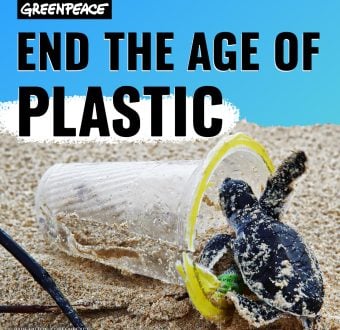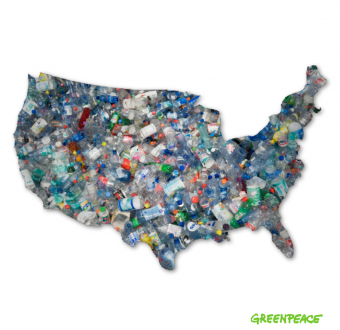Washington, DC (April 4, 2024)—Almost two-thirds of the U.S. supports a Global Plastics Treaty that would ban single-use plastic packaging, according to a new Greenpeace International poll released ahead of the fourth Intergovernmental Negotiating Committee (INC4) meeting for a Global Plastics Treaty, which will be held in Ottawa, Canada this month. The survey indicated strong global public backing for measures aimed at ending single-use plastics and promoting reuse-based solutions.
U.S. support showed a clear majority preferring a strong Global Plastics Treaty, while the global results showed even stronger preferences. Further, roughly three-quarters of U.S. respondents would use refillable and reusable packaging if it was more convenient or more cost-effective.
Graham Forbes, Greenpeace Head of Delegation to the Global Plastics Treaty negotiations and Global Plastics Campaign Lead for Greenpeace USA, said: “The level of public support demonstrated by this survey sends a clear message: the vast majority of people want a Global Plastics Treaty that cuts plastic production and ends single-use plastic. It is time for world leaders to listen and rise to the occasion. They must stand up to the fossil fuel industry and deliver a strong and ambitious treaty that represents the will of the people, or face significant political repercussions.”
Globally, key findings from the survey of 19,088 people in 19 countries include:
- 82% of respondents support cutting the production of plastic to stop plastic pollution. [1]
- 80% of respondents advocate for protecting biodiversity and the climate by reducing plastics production. [2]
- 90% of respondents endorse transitioning away from single-use plastic packaging to reusable and refillable alternatives. [3]
- 75% of respondents support a ban on single-use plastic packaging. [1]
- 80% of respondents express concern [1] about the health impacts of plastic on their loved ones and 84% of parents surveyed express concern about the health impacts of plastic on their children. [4]
The survey reveals consistent support for ambitious action on plastics across all surveyed countries, particularly in the Global South regions where plastic pollution levels are notably high. Support for these measures surpassed the 50% mark in all categories, with even the lowest percentage, a significant 60%, supporting the exclusion of oil, gas, and chemical industry lobbyists from the treaty negotiations.
The U.S. is a top producer and consumer of plastic. A 2022 Greenpeace USA report shone a spotlight on the depth of the nation’s plastic problem. Less than 6% of plastic waste is recycled, with more than 51M tons of plastic wrappers, bottles, and bags discarded in 2021. Roughly 95% of that plastic ended up in landfills, oceans, or scattered in the atmosphere in tiny toxic particles, the report found. A significant amount is also exported to landfills in the Global South, where it contributes to the plastic pollution problem impacting marginalized communities. Last year, the U.S. exported nearly 200M tons of plastic waste to Vietnam, India, Malaysia, Indonesia, and Mexico.
Domestically, the extraction of oil and gas, production, and disposal of plastic disproportionately impacts Black, Indigenous, and other communities of color where these facilities are predominantly located.
Jo Banner, resident of Louisiana’s Cancer Alley and Co-Director of an environmental justice advocacy organization, the Descendants Project: “The communities of color that live among the plastic manufacturers in ‘Cancer Alley’ are not the only ones worried about plastics, here in the U.S. or around the world. For all of us, our health, bodies, and communities matter. We refuse to be treated as a mere checkmark on a list of concerns, and we cannot continue to be sacrificial zones. We need our governments to truly listen to our needs and help create a strong Global Plastics Treaty that protects communities like ours. We must ensure that “Cancer Alley” is confined to the past, not a part of the future we gift our children.”
More than 3,200 identified chemicals found in plastics have been associated with severe health concerns, including cancer, nervous system disorders, and hormonal imbalances. These chemicals have been implicated in the development of diseases such as cancer, heart conditions, and obesity.
Dr. Leo Trasande, a respected doctor who has extensively researched the health risks of plastic said: “The health risks from the chemicals found in plastics have not gone unnoticed. They cost our economy hundreds of billions of dollars because of increases in disease and disability, which contributes to their lack of popularity. A strong global treaty is essential for people here in the U.S. and around the world.”
Over 99% of plastic is made from oil and gas, and with production set to skyrocket, it is a significant driver of climate change, which also disproportionately impacts marginalized communities. Plastics accelerates inequality, exacerbates social injustice, and compounds environmental degradation.
Greenpeace USA and 22 other organizations, including the Descendants Project, have jointly sent a letter to President Biden requesting a meeting to discuss the concerns of people most affected by the toxic pollution caused by the American Chemistry Council (ACC) and the companies within the plastics industry it represents, such as Dow, Exxon, and Dupont. Greenpeace USA also recently unveiled a new monument dedicated to the Biden administration and its potential plastic legacy if he does not show strong leadership.
Last February, during the first round of global treaty talks, President Biden acknowledged the need to end plastic pollution by 2040. But so far, U.S. government regulation has sided with large oil and gas companies—some of the biggest plastics producers—instead of working to cap their production. The US also stands in the way of health protections by closely aligning with the industry that continues to produce plastics that harm human health.
Government ministers from 173 countries are set to gather in Ottawa, Canada, from April 23 to 29, 2024, for the INC4 conference to negotiate a legally binding Treaty. Greenpeace USA is demanding that the Biden Administration support a strong and binding Global Plastics Treaty that cuts total plastic production by at least 75% by 2040 to protect human health and biodiversity and ensure that global temperatures stay below 1.5° C.
The INC3 meeting in Nairobi, Kenya, in November 2023 ended in frustration and without a mandate to create a first draft of the treaty as low-ambition countries derailed the negotiations. Instead, the preliminary draft was reworked to add weaker options, resulting in a convoluted document. The last negotiation meeting will happen in Busan, South Korea in November 2024.
###
Notes to the editors:
The research was conducted by Censuswide, from a sample of 19,088 members of the public in the UK, USA, Canada, India, Brazil, Egypt, Germany, Mexico, South Africa, Philippines, Indonesia, Japan, Thailand, South Korea, China, United Arab Emirates, Malaysia, Austria, and Norway. The data was collected between the 16th and 26th of February 2024.
[1] ‘Strongly agree’ and ‘Somewhat agree’ responses combined
[2] ‘Strongly support’ and ‘Somewhat support’ responses combined
[3] ‘Essential’, ‘Very important’, and ‘Fairly important’ responses combined
[4] ‘Very concerned’ and ‘Quite concerned’ responses combined
People vs. Plastic: Global Support for a Strong Plastics Treaty full report can be found here.
Executive Summary can be found here.
Greenpeace demands for a Global Plastics Treaty can be found here.
Photos and videos of Greenpeace network petition deliveries are available here.
Photos and videos of the Biden Monument unveiling are available here.
Contact: Tanya Brooks, Greenpeace USA Senior Communications Specialist, P: 703-342-9226, E: [email protected]
Greenpeace USA is part of a global network of independent campaigning organizations that use peaceful protest and creative communication to expose global environmental problems and promote solutions that are essential to a green and peaceful future. Greenpeace USA is committed to transforming the country’s unjust social, environmental, and economic systems from the ground up to address the climate crisis, advance racial justice, and build an economy that puts people first. Learn more at www.greenpeace.org


